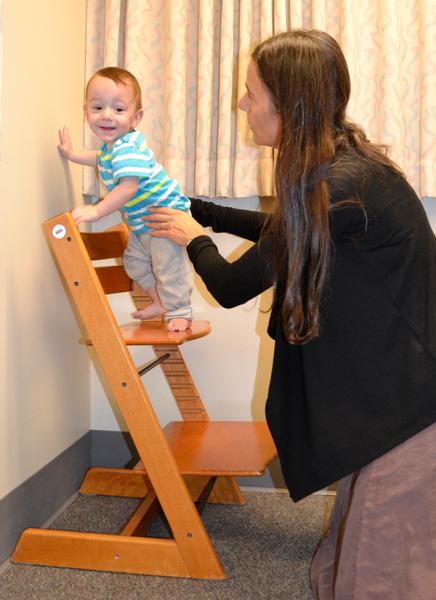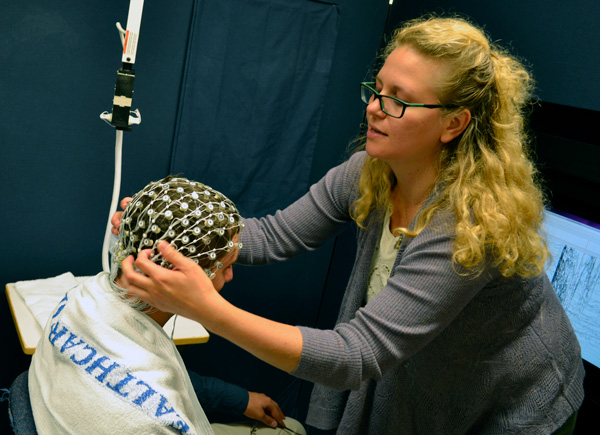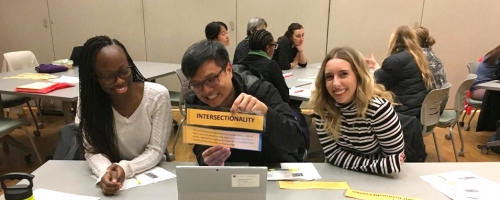Vision

Inclusive communities where people with intellectual and developmental disabilities can live, learn, work, and thrive.
Mission
To support our vision through:
- Scientific Discovery
- Education and Training
- Leadership Development
- Clinical Services
- Community Engagement
- Policy Change
- Advocacy Activities
About
The IHDD has three main components: the Eunice Kennedy Shriver Intellectual and Developmental Disabilities Research Center (IDDRC), the University Center for Excellence in Developmental Disabilities (UCEDD), and The Leadership Education in Neurodevelopmental and Related Disabilities (LEND) center (which is a program within the UCEDD)
The Intellectual and Developmental Disabilities Research Center (IDDRC): The focus of the IDDRC is to discover ways to prevent and treat developmental disabilities and support childhood development. The IDDRC is one of 15 centers funded by the NIH and focuses on supporting scientific research that will help children and adults with disabilities live, learn, work, and enjoy their lives.
The University Center for Excellence in Developmental Disabilities (UCEDD): The UCEDD is one of 68 programs in the US and is focused on community service (including many clinics), advocacy, interdisciplinary training, and information dissemination.
The Leadership Education in Neurodevelopmental and Related Disabilities (LEND) Program: The LEND program is one of 52 programs and is an interdisciplinary training program which prepares health professionals for leadership roles in providing health care for individuals with neurodevelopmental disabilities and their families.
Specialty Clinics

The IHDD offers comprehensive interdisciplinary evaluation and support for individuals and families navigating neurodevelopmental disabilities. Our diverse range of specialized clinics include autism, genetics, neurodevelopment, fetal alcohol spectrum disorder, pediatric audiology, and phenylketonuria clinics. Our clinics are dedicated to addressing a wide spectrum of developmental disabilities across the life span and providing tailored care to promote well-being and improve quality of life.
Our Clinics
- Adult Autism Clinic
- UW Autism Center
- Biochemical Genetics Clinic
- Cardiac Neurodevelopment Clinic
- Child Development Clinic
- Down Syndrome Specialty Clinic
- Fetal alcohol spectrum disorder (FASD)
- Infant Development Follow-up Clinic (IDFC)
- Late and Moderate Preterm Babies (LAMBS) Clinic
- Pediatric Audiology Clinic
- Phenylketonuria (PKU) Clinic
Key Research Areas
IHDD’s research programs focus on advancing the understanding and treatment of intellectual and developmental disabilities through interdisciplinary collaboration. Key research areas include: (1) Biologic Basis of Developmental Disorders, (2) Acquired Brain Injury and Repair, (3) Developmental Toxicology, (4) Epilepsy, (5) Hearing and Vision Disorders, (6) Autism - genetics, biomarkers & therapeutics, and (7) Development and Evaluation of Therapeutic Interventions.
- Intellectual and Developmental Disabilities Research Center (IDDRC) Cores
The University of Washington’s Eunice Kennedy Shriver Intellectual and Developmental Disabilities Research Center (IDDRC), based at the Institute on Human Development and Disability (IHDD), provides a comprehensive interdisciplinary research program in the field of intellectual and developmental disabilities (IDD).
The IDDRC empowers research affiliates by providing access to cutting-edge technologies and data analysis techniques. Core services provided include experimental design support, grant development, equipment and space access, staff training, research expertise and best practices, and the coordination of UW resources. We also provide support for early career researchers. Scientific core support facilities are as follows: (1) Animal Behavior, (2) Brain Imaging, (3) Clinical Translational, and (4) Genetics. Core values of Early Career Facilitation and Diversity and Equity thread through all our activities.
- Animal Behavior Core
The Animal Behavior Core (ABC) provides an infrastructure for investigators to perform advanced and innovative functional assessments in rodent models to assist in understanding the origins and treatment of intellectual and developmental disabilities (IDD). The ABC supports efforts aimed at developing and characterizing novel rodent models of IDD that result from gene identification or gene modification research or environmental exposure studies performed by IDDRC Research Affiliates. - Brain Imaging Core
The Brain Imaging Core (BIC) provides the technical foundation to support and promote interdisciplinary image-based neuroscience research in the field of intellectual and developmental disabilities (IDD). BIC seeks to enhance our basic science understanding of IDD and support our ultimate goals of early diagnosis, prevention, and new treatment methods by facilitating cutting-edge neuroimaging research and training. To accomplish our overall mission, BIC provides IDDRC Research Affiliates with extensive resources in magnetic resonance imaging (MRI), electrophysiology recordings (electroencephalography, EEG and magnetoencephalography, MEG), and positron emission tomography. - Clinical Translational Core
The Clinical Translational Core functions as a service to IDDRC scientists to promote and support clinical and translational research in the field of Intellectual and Developmental Disabilities (IDD). - Genetics Core
The Genetics Core is designed to integrate cutting-edge genomic technologies into the research programs of investigators, to enhance the understanding of Intellectual and Developmental Disabilities (IDD) and develop future treatments. The translational mission of our IDDRC includes supporting research aimed at identifying genetic causes of IDDs that will inform prognostic information, recurrence risk counseling, monitoring for associated medical complications, and supportive treatments.
- Animal Behavior Core
- University Center for Excellence in Developmental Disabilities (UCEDD) Research Areas
The UW University Center for Excellence in Developmental Disabilities (UW UCEDD) supports 4 core functions, including:
- Interdisciplinary Training
- Community Service
- Information Dissemination
- Research and Evaluation
The UW UCEDD is authorized under the DD Act and is part of a network of 68 UCEDDs across the United States and territories. It is one of the three partners in the DD Network and works closely with the Washington State Developmental Disability Council and the Washington State Protection and Advocacy System—Disability Rights Washington. It connects with self-advocacy organizations in Washington State, including Allies in Advocacy, Self Advocates in Leadership (SAIL), and People First of Washington as well as other advocacy organizations like the ARC of Washington.
The UW UCEDD hosts 7 programs listed below:
- Adults and Elders
The purpose and goal of the Adults and Elders Program is to promote the health and overall quality of life of adults with developmental disabilities. - UW Autism Center
The UW Autism Center is one of the first autism centers to provide clinical services, professional training, and internationally recognized research. - Center for Technology and Disability
The Center for Technology and Disability focuses on a broad range of topics related to disability and the supportive use of technology. - Clinical Training Unit
The Clinical Training Unit (CTU) provides training, research, and exemplary services in the diagnosis and treatment of children with developmental disabilities. - Community Disability Policy Initiative
The Community Disability Policy Initiative (CDPI) is designed to bring about systematic change that increases the awareness about and opportunities for individuals with developmental disabilities. - Genetics Program
The Genetics Program serves individuals with a genetic disorder or disability. Clinics offer diagnosis, assessment, treatment, and counseling services. - The Haring Center
The Norris and Dorothy Haring Center for Research and Training in Inclusive Education provides early childhood education to children with and without disabilities.
- Leadership Education in Neurodevelopmental and Related Disabilities (LEND) Research
UW LEND is located at the University of Washington, Institute on Human Development and Disability, a University Center for Excellence in Developmental Disabilities (UCEDD). The UW LEND serves as a center of excellence preparing the next generation of leaders to support individuals with developmental disabilities and their families in achieving their full potential.
The UW LEND is an interdisciplinary training program committed to preparing graduate students, post-graduate fellows, mid-career health professionals, family members and self-advocates to:
- Practice interdisciplinary care for individuals with developmental disabilities and their families.
- Practice family-centered care that is responsive to the diversity of the community and promotes inclusion and equity.
- Advocate for systems and policies that best serve individuals with a developmental disability.
- Assume leadership roles.
UW LEND is funded under the Autism Collaboration, Accountability, Research, Education and Support (CARES) Act, administered by the federal Health Resources and Services Administration (HRSA), Maternal and Child Health Bureau (MCHB), as a part of a national network of LEND programs.

The Institute on Human Development and Disability (IHDD) at the University of Washington is dedicated to developing the next generation of leaders in the field of intellectual and developmental disabilities. Our comprehensive training programs provide healthcare professionals, educators, and researchers with the expertise necessary to support individuals with intellectual and developmental disabilities across various settings.
- Leadership Education in Neurodevelopmental and Related Disabilities (LEND)
The LEND program is an interdisciplinary initiative designed to prepare health professionals for leadership roles in providing care and support for individuals with neurodevelopmental disabilities. The program offers advanced training in clinical care, policy development, and advocacy, equipping participants with the skills needed to lead in their respective fields. - UW Autism Center Training
The UW Autism Center offers a range of training programs, including workshops, seminars, and continuing education courses, which focus on the latest research and evidence-based practices in autism spectrum disorder (ASD) treatment and intervention. These programs are designed to enhance the knowledge and skills of professionals working with individuals with ASD. - Haring Center Training Programs
The Haring Center provides specialized training for educators and clinicians, with a particular emphasis on inclusive education practices and early intervention strategies. Our programs are designed to foster the development of effective, inclusive environments that support the needs of all learners. - Training for Residents and Fellows
The IHDD also offers robust training opportunities for Pediatric and Family Medicine residents, as well as Developmental Pediatrics and Neonatology Fellows. Residents in the Pediatric Residency Program and the Family Medicine Residency Program can choose elective training in supporting the unique health needs of children with intellectual and developmental disabilities. Additionally, the Developmental Pediatrics and Neonatology Fellowships provides advanced training in this area.
Mark Harniss, PhD
Interim Director, Institute on Human Development and Disability (IHDD) Director, University Center for Excellence in Developmental Disabilities (UCEDD) Director, Center for Technology and Disability Studies
Sandra Juul, MD, PhD
Professor Adjunct Professor of Neuroscience Director, Intellectual and Developmental Disabilities Research Center (IDDRC)
Institute on Human Development and Disability (IHDD)
University of Washington
Box 357920, Seattle, WA 98195-7920
Phone: 206-543-7701
Email: ihdd@uw.edu
Website: www.ihdd.org


